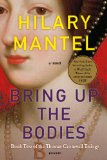Summary | Excerpt | Reading Guide | Reviews | Beyond the Book | Readalikes | Genres & Themes | Author Bio

Wolf Hall Trilogy #2
by Hilary Mantel
The king had left Whitehall the week of Thomas More's death, a miserable dripping week in July, the hoof prints of the royal entourage sinking deep into the mud as they tacked their way across to Windsor. Since then the progress has taken in a swathe of the western counties; the Cromwell aides, having finished up the king's business at the London end, met up with the royal train in mid-August. The king and his companions sleep sound in new houses of rosy brick, in old houses whose fortifications have crumbled away or been pulled down, and in fantasy castles like toys, castles never capable of fortification, with walls a cannonball would punch in as if they were paper. England has enjoyed fifty years of peace. This is the Tudors' covenant; peace is what they offer. Every household strives to put forward its best show for the king, and we've seen some panic-stricken plastering these last weeks, some speedy stonework, as his hosts hurry to display the Tudor rose beside their own devices. They search out and obliterate any trace of Katherine, the queen that was, smashing with hammers the pomegranates of Aragon, their splitting segments and their squashed and flying seeds. Instead – if there is no time for carving – the falcon of Anne Boleyn is crudely painted up on hatchments.
Hans has joined them on the progress, and made a drawing of Anne the queen, but it did not please her; how do you please her, these days? He has drawn Rafe Sadler, with his neat little beard and his set mouth, his fashionable hat a feathered disc balanced precariously on his cropped head. 'Made my nose very flat, Master Holbein,' Rafe says, and Hans says, 'And how, Master Sadler, is it in my power to fix your nose?'
'He broke it as a child,' he says, 'running at the ring. I picked him up myself from under the horse's feet, and a sorry bundle he was, crying for his mother.' He squeezes the boy's shoulder. 'Now, Rafe, take heart. I think you look very handsome. Remember what Hans did to me.'
Thomas Cromwell is now about fifty years old. He has a labourer's body, stocky, useful, running to fat. He has black hair, greying now, and because of his pale impermeable skin, which seems designed to resist rain as well as sun, people sneer that his father was an Irishman, though really he was a brewer and a blacksmith at Putney, a shearsman too, a man with a finger in every pie, a scrapper and brawler, a drunk and a bully, a man often hauled before the justices for punching someone, for cheating someone. How the son of such a man has achieved his present eminence is a question all Europe asks. Some say he came up with the Boleyns, the queen's family. Some say it was wholly through the late Cardinal Wolsey, his patron; Cromwell was in his confidence and made money for him and knew his secrets. Others say he haunts the company of sorcerers. He was out of the realm from boyhood, a hired soldier, a wool trader, a banker. No one knows where he has been and who he has met, and he is in no hurry to tell them. He never spares himself in the king's service, he knows his worth and merits and makes sure of his reward: offices, perquisites and title deeds, manor houses and farms. He has a way of getting his way, he has a method; he will charm a man or bribe him, coax him or threaten him, he will explain to a man where his true interests lie, and he will introduce that same man to aspects of himself he didn't know existed. Every day Master Secretary deals with grandees who, if they could, would destroy him with one vindictive swipe, as if he were a fly. Knowing this, he is distinguished by his courtesy, his calmness and his indefatigable attention to England's business. He is not in the habit of explaining himself. He is not in the habit of discussing his successes. But whenever good fortune has called on him, he has been there, planted on the threshold, ready to fling open the door to her timid scratch on the wood.
Copyright © 2012 by Hilary Mantel




Harvard is the storehouse of knowledge because the freshmen bring so much in and the graduates take so little out.
Click Here to find out who said this, as well as discovering other famous literary quotes!
Your guide toexceptional books
BookBrowse seeks out and recommends the best in contemporary fiction and nonfiction—books that not only engage and entertain but also deepen our understanding of ourselves and the world around us.